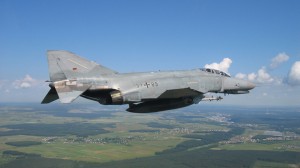
A German F-4 Phantom II fighter jet conducts air policing over the Baltic states. Since March 2004, when the Baltic states joined NATO, alliance nations have policed the airspace over the area on three-month rotation from Lithuania's First Air Base in Šiauliai. Photo used courtesy of NATO.
RIGA — The Economist reported on Thursday that according to “sources close to the talks” NATO agreed to draft a defense contingency plan for the Baltic states.
General James Craddock, NATO’s supreme commander at the time, asked the alliance for approval of a contingency plan for the Baltics in October 2008. However Germany and France opposed the measure, fearing it would unnecessarily agitate Russia, and the issue as been debated in secret within the alliance since.
Russia is a member of NATO’s Partnership for Peace program and the alliance has repeatedly said that it does not consider its former foe a threat, but the 2008 Russia-Georgia War and the security concerns of the Baltic state governments prompted Craddock’s request.
Neither NATO nor the Baltic state governments are publicly discussing the contingency plan’s status, which is classified.
During the fall, Russia and Belarus conducted joint military exercises along the borders of the Baltic states. This summer, the U.S. is planning a bilateral military exercise with the Baltic states.













This is a good news. Anti-NATO and pro-Russia advocates will have to shut up for the time bing. It was rather trendy to sscream “hey, but NATO won’t help you in case of a real conflict:”. They won’t be able to say that now.
This, however, does not mean that the Baltic countries do not have to at least ensure the air-policing mission by themselves i.e. they should purchase a number (say 10 in total) of fighter jets which would be used for the air-policing mission. Not because NATO will not ensure our safety (I’m sure it will) but simply out of self-respect as well as respect to other NATO members and in order to show NATO that we can contribute to our own safety as well.